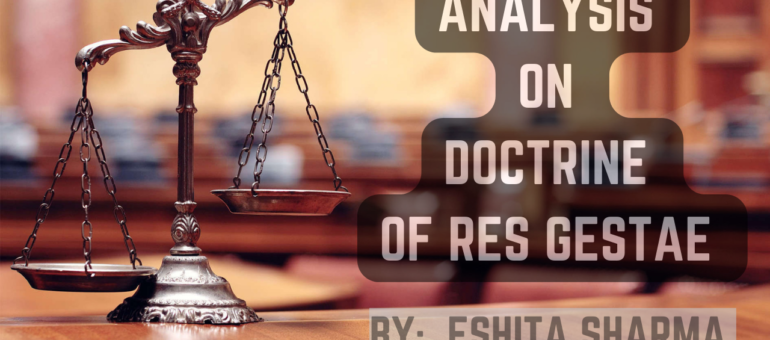ANALYSIS OF DOCTRINE OF RES GESTAE under Indian Evidence Act 1872
Table of Contents
INTRODUCTION:-
To begin with, section 6 to 9 of Indian evidence act 1872 enumerates the ways in which facts though not in issue are so connected with fact in issue as to form part of principle fact in issue.
The principle of res gestae was first propounded in the year 1693, in the case known as Thompson V.Trevanion.
DOCTRINE OF RES GESTAE:-
- The term “res gestae” is Latin term which simply means “things said or done in same course of action”.
- If we look for a deeper meaning of “res gestae” it states that, those facts, circumstances or instances which are in continues motion of principle fact and are considered relevant under the act. It is the spontaneous declaration made by person during the happening of an event.
- It includes everything which can be taken into consideration while adducing the relevancy of fact.
- It may include everything that has been said or done and also include unsaid and undone deeds during the occurrence of an event.
- The fact , things said , declarations or any act shall be closely interwoven with the principle act in order to form part of that same transaction
- Things said or done may be done at same time or place or at different time and place
- The words spoken by the accused or by bystanders at the time of occurrence of the event forms part of this doctrine .The statement should not be the mere narrative any event that occurred in past.
SECTION 6 OF EVIDENCE ACT:-
It embodies the core essence of doctrine of res gestae. It states that facts though not in issue are so connected with fact in issue as to form part of same transaction, whether they occur at same time or place or different time and place.
The test of admissibility of fact as evidence is its proximity with the principle transaction.
RES GESTAE AS EXCEPTION TO HEARSAY EVIDENCE:
Supreme Court in Genetela vyavardhan rao v. state of Andhra Pradesh has stated the following:
- It is an exception to the cardinal rule of law that hearsay evidence is not admissible.
- Hearsay evidence simple means person’s evidence is based upon the third party’s opinion and thus it is inadmissible
- Res gestae constitutes as an exception to this general rule and hence relevant.
RELEVANT CASE LAWS
R V.FOSTER
- Witness had seen the speeding truck but he did not see the accident that took place
- Deceased person told him about the accident that took place before he died
- Court held that statement of deceased to the witness is admissible as res gestae.
SANWAL DAS V.STATE OF BIHAR
‘X’ assaulted ‘y’ on the neck and this was seen bystanders who exclaimed ‘x’ is killing ‘y’.
Court held that this exclamation made by standers is very much a part of transaction as gushing out of blood from the wound is and hence forms part of relevancy of fact .
R V. BEDINGFIELD
Witness saw a deceased woman came running and exclaimed “o dear aunt! Look what z has done to him’’.
Court held the statement of witness relevant as res gestae.
CONCLUSION:-
The doctrine of res-gestae helps the court to connect the missing link and adduce the evidence which plays a crucial role in order to understanding the circumstances in a better way.
It also enables the court to take into consideration all the indispensable details of the transaction.
READ ALSO
Justice K.G. BALAKRISHNAN, former Chief Justice of India Biography, Wiki & More
Medha Kotwal Lele v/s Union of India: A petition against sexual harassment of women

